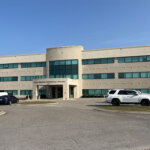Urology
Singing River Health System partners with board certified urologists to provide the highest quality diagnosis and treatment of urological conditions in our state.

Board Certified Urologists Serving the Mississippi Gulf Coast
Singing River Health System works with the coast’s best urologists to help diagnose and treat illnesses associated with the bladder, urethra, ureters, kidneys, and adrenal glands in men and women as well as the reproductive system.
Urologic Issues & Procedures
Bladder
| Bladder cancer Hematuria (blood in urine) Incontinence Neurogenic bladder Overactive bladder Prostatitis Urethral stricture Urinary retention Urinary tract infection (UTI) | Vesicoureteral Reflux (Backward Urine Flow) Voiding dysfunction Cystoscopy Transurethral Removal Bladder Tumor (TURBT) |
Cancer
| Adrenal cancer Bladder cancer Kidney cancer | Prostate cancer Testicular cancer |
Urogynecology Services
Board certified urogynecologist, Dr. Paul Moore, diagnoses and treats all pelvic floor conditions:
| Axonics Fecal Incontinence Interstitial Cystitis Hysterectomy Menopause & Hormone Replacement Overactive Bladder Painful Intercourse | Urinary Incontinence Urinary Tract Infection Uterine Prolapse Vaginal Mesh Complications Vaginal Relaxation Vulvovaginal Issues & Vaginal Atrophy |
Men’s
| Benign prostatic hyperplasia (BPH) or prostate gland enlargement Erectile dysfunction | Male infertility Peyronie’s disease Vasectomy & vasectomy reversal |
Vasectomy & Vasectomy Reversal
A vasectomy is a highly effective way for men to plan for their future when they have decided not to have more children. This minor surgical procedure offers a permanent solution to contraception. However, if you change your mind, vasectomy reversal procedures are also available.
Vasectomy Options
Kidney Stone Treatment
Kidney stones happen to 1 in 11 adults in the US. While they cause pain, urination issues, and more, we have treatment options to help making passing them easier.
Kidney Stones
UroNav Prostate Biopsy
By combining MRI images with ultrasound, UroNav creates detailed, 3-D images of the prostate for more accurate biopsies and in difficult-to-reach areas.
Learn About UroNav
Robotic Surgical Procedures
These highly trained urologists perform technologically advanced surgical procedures using the da Vinci Surgical System in our state-of-the-art surgical suites at Singing River’s three hospitals. The system enables the surgeon to operate through fewer, smaller incisions, allowing for more precise hand movement, greater range of motion, and magnified vision. Robotic surgery is used to perform the following minimally invasive or laparoscopic procedures:
- Prostate removal (radical prostatectomy)
- Kidney cancer (radical & partial nephrectomy)
- Adrenal gland removal (adrenalectomy)
- Vaginal vault prolapse treatment (colposacropexy)
- Partial and full bladder removal (cystectomy)
- Vesicovaginal fistula repair
- Removal of ureter blockages (pyeloplasty)








